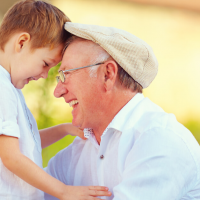The Unique Experience of Mourning the Loss of a Loved One With Dementia

At times, dementia can feel as difficult for the loved ones of a patient as it is for the patient themselves. It’s hard to know how difficult it may be for the patient as they may lose their ability to express their thoughts and emotions. What is known on the other side of disease is the unique and gradual nature of mourning the loss of someone who has passed away due to dementia. To help explain this, we bring a personal story from an associated party.
The day of my grandfather’s viewing was a difficult one. Though he had been experiencing dementia in varying stages for many years, I lived a busy life hundreds of miles away and was subsequently unable to regularly visit him. Because of these less frequent visits to witness his deteriorating condition, the silver lining was that I still thought of him as the Superman I remembered him as throughout my childhood. Now, he was just a fellow in a casket...with his mouth wide open.
I came to learn that he had died in his sleep, but that he also slept with his mouth wide open most of the time. This odd combination meant that his mouth way now stuck open with no way of closing it short of gluing his lips together. There he lay in his casket, Prairie Home Companion tie (his favorite radio show), face looking stretched and odd. With just a few hours before guests were slated to arrive, my grandmother called the funeral director over.
“Excuse me, sir. My husband’s mouth looks especially odd. Is there anything we can do?”
The funeral director explained that his jaw was locked open, but that it was possible that enough time had passed that they may be able to close it.
I remember looking over the lapels and of my suit and the old fashioned couches in the viewing room to see a funeral director forcefully, yet discreetly trying to force my deceased grandfather’s mouth closed as my grandmother looked over his shoulder. In that moment, I’m not sure what came over me. I lept to my feet, with tears welling in my eyes, and began to sprint in the direction of the director. My older brother saw my approach and held me back.
“Leave him alone!” I exclaimed from the inside of my brother’s elbow. Tears ran down my face as it felt like my voice had shaken the flowers that lined the casket. I collapsed into my brother’s arms, soaking his suit jacket in tears. He led me over to the couch so I could sit down and catch my breath.
My grandmother approached me with a glass of water and calm concern. She handed me the water with a delicate smile, her eyes completely dry while my own gushed.
“How can you be so ok with that man touching him? Why aren’t you more outraged?” I asked, almost immediately regretting my negative tone.
“Sweetie, I’ve been mourning the love of my life, your grandfather, for years. My grieving occurred over many months before this day, as he drifted further from this world while still physically with us. My eyes are dry now because he’s free. He’s not in that casket. That man can’t hurt him. Nothing can hurt him anymore.”
I then fell her into her arms, wishing I had been as so blessed as to be as collected as she was. Still, she had mourned in a very unique way—a way all too common for the close loved ones of those with dementia.
In fact, many end up grieving the loss of their loved ones with dementia long before their passing. This form of pre-grieving can make the actual death of their loved ones somewhat confusing. Unlike the above speaker’s grandmother who realized why she wasn’t in a state of mourning at her own husband’s passing, many others may need this explained to them to reconcile their feelings.
If you presently have a loved one with dementia, it's important to understand the stages of dementia as well as the stages of your own grieving to plan for the best care for them and support for yourself. Professionals are standing by to provide support for your family during your unique time of need.
Hospice & Palliative Care in Tulsa, OK
If you’re looking for nurturing and professional hospice or palliative care services in Tulsa, Oklahoma, look no further than the friendly services from Cura HPA Hospice & Palliative Care.



